|
|
|
Sort Order |
|
|
|
Items / Page
|
|
|
|
|
|
|
| Srl | Item |
| 1 |
ID:
134079
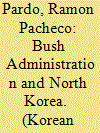

|
|
|
|
|
| Publication |
2014.
|
| Summary/Abstract |
Why did the George W. Bush Administration change its policy toward North Korea from confrontation to accommodation during the second nuclear crisis? This article answers the question by analyzing how and why a coalition-including Bush Administration doves, China, Russia, South Korea and, at times, Japan and North Korea-worked together to overcome the reticence of Bush Administration hawks to engage with Pyongyang. Building on the soft balancing, bureaucratic politics, and transgovernmental coalitions literature, this article explains how the Six-Party Talks served this coalition to understand the extent to which they shared goals and policies. Aware of the divisions within the Bush Administration regarding policy toward North Korea, the five other parties to the talks were able to undermine the preferred policies of U.S. hawks while supporting the policies of doves. Thus, rather than determining Washington's behavior, this coalition laid the ground for U.S. officials supportive of accommodation to upload their preferences into official Bush Administration's policy. This article therefore also sheds light on how soft balancing can be used by third parties to influence the decision-making process in the United States.
|
|
|
|
|
|
|
|
|
|
|
|
|
|
|
|
| 2 |
ID:
117641


|
|
|
|
|
| Publication |
2012.
|
| Summary/Abstract |
China, as host of the six-party talks first convened in August 2003, has
been one of the major players in dealing with the North Korean nuclear crisis that
began in October 2002. China's role in the talks has helped to start shaping a stable
regional security architecture in Northeast Asia. Beijing's leadership in building a
new security regime in the region suggests a change on Chinese perspectives regarding its role within the broader East Asia's regional security architecture. After years of
passiveness with regards to involvement in security regime building in the region,
China has evolved into an active leader seeking to shape a more institutionalized
security. Despite the obstacles to building a functioning regime in Northeast Asia,
China seems poised to continue working towards creation of a more stable and
institutionalized security architecture.
|
|
|
|
|
|
|
|
|
|
|
|
|
|
|
|
| 3 |
ID:
140417


|
|
|
|
|
| Summary/Abstract |
Three decades of financial crises culminating in the global financial crisis have prompted the development of multilayered global financial governance. This article examines the relationship between the global and regional layers by analyzing the case of the global and ASEAN+3 financial safety nets. Making use of regime theory, we examine the evolution of the characteristics, main institutions, goals, and behavioral expectations of these two nets. The article argues that the ASEAN+3 regional financial safety net, which was mostly developed following the East Asian financial crisis of 1997, complements rather than undermines the global financial safety net. Similar characteristics, goals, and behavioral expectations underpin this complementarity.
|
|
|
|
|
|
|
|
|
|
|
|
|
|
|
|
| 4 |
ID:
129625
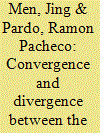

|
|
|
|
|
| Publication |
2014.
|
| Summary/Abstract |
The EU and China, the first and third largest economies in the world, launched a strategic partnership in 2003. From the onset, this partnership had two main objectives: deepening and broadening cooperation and enhancing bilateral collaboration on a wide range of policy areas at the global level. On the 10th anniversary of the partnership, this special issue seeks to provide a comprehensive analysis of the mechanisms, the evolution and current state of EU-China relations, and the divergence and convergence between them on a number of issues. The special issue includes articles setting out the historical and institutional background behind the EU-China partnership, examining their cooperation and problems in the economic, financial, climate change and security fields as well as in relation to third parties. In this way, this special issue covers the most important fields of policy coordination and cooperation between the EU and China.
|
|
|
|
|
|
|
|
|
|
|
|
|
|
|
|
| 5 |
ID:
129637


|
|
|
|
|
| Publication |
2014.
|
| Summary/Abstract |
The global financial crisis (GFC) and subsequent Eurozone sovereign debt crisis (ESDC) have made reform of the global financial governance regime a priority for governments around the world. Prior to the crisis, neoliberal policies agreed between the European Union and the USA created a financial governance regime based on the principle of free operation of the market through the norms of market self-regulation, equal access to the market, and stability via institutional supervision. How will global financial governance look like after these crises? And what role can the EU and China play in shaping this regime? This article argues that as a result of the GFC and the ESDC, stability is becoming a second principle of global financial governance, along with the free operation of the market. Meanwhile, European and Chinese views regarding the norms, rules, and decision-making procedures designed to implement those principles do not differ as much as they used to. Thanks to interactions at the bilateral and multilateral levels, the EU and China now have knowledge regarding how the other understands the role and characteristics that financial governance should have. This is leading to convergence in some areas and cooperation in others. Concurrently, there are also areas of competition. Analysing all of these is essential to understand how global financial governance might evolve, given the central role that the EU and China now play in this regime.
|
|
|
|
|
|
|
|
|
|
|
|
|
|
|
|
| 6 |
ID:
160468
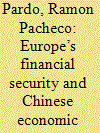

|
|
|
|
|
| Summary/Abstract |
The core of the Belt and Road Initiative (BRI) involves trillions of US$ in investment to increase and improve connectivity between China and different parts of the world. This includes tens of billions of US$ to build or upgrade roads, rail lines, ports, pipelines and other infrastructure to connect China with Europe. With the European continent still feeling the effects of the Global Financial and Eurozone Sovereign Debt crises, this is an opportunity to strengthen its financial security by gaining access to a new source of financing. This new source, however, is linked to Chinese economic statecraft. Thus, cash-starved Europe can tap on the recently launched Silk Road Fund, Maritime Silk Road Fund and other initiatives from the Chinese government. Concurrently, however, political divisions within Europe derived from Chinese investment, as well as normative differences in terms of standards and practices present a challenge to the continent. This article thus analyses the effects of BRI, presented as a tool of Chinese economic statecraft, on Europe’s financial security. It argues that in spite of the latent challenges to said security, the potential benefits have already led many European countries to seek to tap on BRI’s investment as a means to strengthen their financing position.
|
|
|
|
|
|
|
|
|
|
|
|
|
|
|
|
| 7 |
ID:
111023
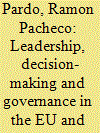

|
|
|
|
|
| Publication |
2012.
|
| Summary/Abstract |
The global financial crisis of the late 2000s has affected the EU and East Asia differently. The EU has seen its economic, political and social structures undermined by the problems derived from the global crisis and subsequent eurozone sovereign debt crisis. In contrast, East Asia has gone through the global crisis relatively unscathed and has seen its standing at the global level reinforced. As a result, there has been a reconfiguration of leadership, decision-making and governance structures in both regions. In the case of the EU, Germany has emerged as the clear leader of European efforts to solve regional economic problems. Meanwhile, intergovernmentalism has replaced supranationalism as the decision-making and even implementation procedure of choice. Differently, there is no single leader in East Asia. China has become one of the most important powers at the global level, but at the regional level, different countries have shaped East Asia's response to the crisis. Concurrently, there has been some move towards increasing integration, even though intergovernmentalism still defines governance structures in the region. Thus, the global financial crisis of the late 2000s has helped to shape new leadership, decision-making and governance structures in both regions.
|
|
|
|
|
|
|
|
|
|
|
|
|
|
|
|
| 8 |
ID:
111022


|
|
|
| 9 |
ID:
123007
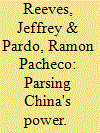

|
|
|
|
|
| Publication |
2013.
|
| Summary/Abstract |
This article draws on Michael Barnett and Raymond Duvall's power typology to examine Chinese power in Sino-Mongolia and Sino-North Korean relations. Using compulsory, institutional, productive, and structural power to frame these bilateral relations, this article looks at the means by which China obtains power and how it utilizes power in relation to Mongolia and the Democratic People's Republic of Korea. This article also examines Mongolian and North Korean perceptions and responses to Chinese power. Concurrently, the article considers the Barnett/Duvall model's applicability to China's relations with other periphery developing states.
|
|
|
|
|
|
|
|
|
|
|
|
|
|
|
|
| 10 |
ID:
088759
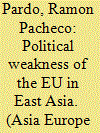

|
|
|
|
|
| Publication |
2009.
|
| Summary/Abstract |
This paper provides a constructivist explanation of the political weakness of the EU in East Asia. By examining the corporate identity of the EU as well as its social identities towards ASEM, China and Japan, I argue that the identities which the EU has constructed towards the outside world and in relation to the region, based on self recognitions of its superpower status and the defence of certain political values, is disliked by both China and Japan for different reasons. Without the support of the two regional superpowers, the EU is not capable of getting involved in the resolution of East Asian hard political affairs.
|
|
|
|
|
|
|
|
|
|
|
|
|
|
|
|
| 11 |
ID:
187983


|
|
|
|
|
| Summary/Abstract |
Russia’s invasion of Ukraine has had repercussions in regions beyond Europe. One of these regions is Asia, including Northeast Asia. This region is home to China and North Korea, two authoritarian countries often lumped together with Russia as potential threats to the liberal international order. The relationship between China and North Korea has thus been affected by Russia’s aggression toward Ukraine. Beijing and Pyongyang share a decades-old alliance. Despite its ups and downs, the alliance survives as of 2022. Russia’s actions in Ukraine have only reinforced it, bringing China and North Korea closer to each other. Both of them have sided with Moscow, and for similar reasons, including their opposition to what they see as the US’s and NATO’s aggressive stance. And both have taken the same actions to support Russia, further strengthening their connection.
|
|
|
|
|
|
|
|
|
|
|
|
|
|
|
|
| 12 |
ID:
134619
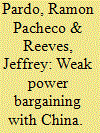

|
|
|
|
|
| Summary/Abstract |
This article examines Mongolia's and North Korea's bargaining with the People's Republic of China to provide insight into Northeast Asian regional dynamics and weak state bargaining behavior. The article demonstrates how both Mongolia and North Korea (which it demonstrates are weak states) employ a variety of tactics within the categories of capitulation, neutrality and confrontation when managing their respective relations with China. The article also argues the applica`bility of the two case studies to a better understanding of the diplomatic challenges China faces as it continues its development and to China's relations with the various weak states on its periphery.
|
|
|
|
|
|
|
|
|
|
|
|
|
|
|
|
|
|
|
|
|